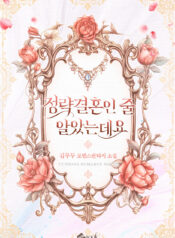In the 26th year of the Kingdom’s Kingdom’s calendar, Arphon Helferion de Bailey, the founding king of the Bailey Kingdom, passed away.
The entire nation was plunged into grief by the death of the late king. The citizens comforted one another in their sorrow, hung black drapes in mourning, and paid their heartfelt respects to him. Clendia flowers were displayed throughout the streets, their fragrance permeating the city. The sound of weeping echoed incessantly. Yet, there was one person who did not grieve—his only son.
The first thing Rigel did upon ascending the throne was to purge the late king’s loyal retainers. He resembled a beast unleashed from its seal.
The first to be cast aside was Chancellor Fraon Himali. Fraon, a founding father of the Kingdom and loyal servant to the first king since his youth, was accused of treason and executed under Rigel’s orders.
What followed was a bloody storm. Rigel did not stop until every person associated with the late king was eradicated. He accused them of various crimes, including treason, embezzlement, and bribery. Everyone knew these accusations were baseless, but they kept silent for fear of implicating themselves. Yet, it was all futile. Even those who stayed quiet eventually found themselves charged if they displeased him.
“Your Majesty, please spare my life…”
“How unfortunate. That’s precisely what I need most.”
With a mere flick of Rigel’s hand, countless lives met their end on the execution grounds. No one and nothing could stop him. Within less than half a year of his reign, half of the officials in key positions had disappeared. Those fortunate enough to survive and be exiled were soon rumored to have met tragic ends elsewhere.
Everyone in the palace moved stealthily, suppressing their presence and breathing carefully. The atmosphere was like a desolate ruin. Even an abandoned haunted house would seem more welcoming in comparison. Depending on Rigel’s mood, a single misplaced word—or even none—could lead to one’s death. The tension suffocated everyone.
On one such day, the girl’s mother abruptly summoned her. Rumors had been circulating that Queen Kate had recently held a private audience with King Rigel.
When the girl heard of her mother’s summons, she was bewildered. Her mother had never called for her before. Those usually distant, sunken eyes barely glanced at her, and even if they did, they were devoid of any warmth. She had never once inquired about her daughter’s well-being during their daily greetings. Her gaze held the cold indifference of staring at an inanimate object. To ask whether her mother loved her seemed laughable—an absurd notion. The girl knew all too well that her mother did not love her. It was impossible not to know. There was no need to wonder why, for someone never loved from the beginning; it was natural. It was an unshakable premise that brought neither pain nor disappointment. Such was the nature of inevitability.
Thus, when summoned, the girl appeared before her mother calmly, neither hopeful nor resentful—merely curious. Why now?
She stood before an intricately carved, massive door. The attendants stationed on either side slowly opened it. The first thing that caught her eye was her red hair, which was identical to hers. Queen Kate was gazing out the window, paying no attention to the girl’s entrance, as if she didn’t even notice her, just as always.
“You called for me, Your Majesty?”
The girl curtsied gracefully, her gesture practiced and familiar. Only then did Kate’s gaze shift to her. Though her light brown eyes still appeared hollow, they had an edge that day, something sharp and unsettling.
Without speaking, Kate gestured for the servants to leave. Once they had gone, the two were alone. Feeling the awkwardness of the moment, the girl dropped her gaze to the floor. But Kate, seemingly unaffected, broke the silence.
“I summoned you because I have a question to ask.“
“Yes.”
As the girl lowered her head in deference, Kate shook hers slightly.
“This might be the only thing I can ever tell you as your mother.”
For a brief moment, the girl’s eyes trembled. It sounded as though Kate were delivering her final words. The girl finally raised her head to meet her mother’s gaze. Those indifferent eyes looked at her for the first time, precise and piercing. The girl instinctively tensed under the intensity of that unfamiliar attention.
“Do you want to live?”
The girl could not understand what she was hearing.
“I don’t know what you mean, Your Majesty.”
“I mean exactly what I asked.”
Even as the girl’s eyes darted nervously, Kate’s voice remained soft yet unyielding, only deepening the girl’s confusion.
Did she want to live? What kind of question was that? Was her mother suggesting she should prefer death?
The girl instinctively took a step back. Kate, observing this, let out a small laugh. It wasn’t mocking, but it carried a sense of emptiness.
“Are you afraid I’ll kill you?“
“…No.”
The girl quietly lowered her head once more.
Kate was the second princess of the Kingdom of Delphia and the queen of the Bailey Kingdom. It was common for royal marriages to serve as political alliances between neighboring kingdoms. Yet, it seemed Kate had never fully accepted her role. In the girl’s memory, her mother always appeared to be gazing into the distance as if she had left something precious far away. Her gaze evoked an inexplicable sorrow even in those who knew nothing of her circumstances. And when she withdrew that distant stare, all that remained was emptiness. She seemed like an empty shell, sitting beside Rigel.
However, the girl did know one thing: her mother was not the kind of person capable of killing anyone. With those dim, light brown eyes, she could barely scratch someone, let alone gravely harm them. Like most people, she was neither a great benefactor nor a grave threat.
But this situation was undeniably strange. Her mother’s words, the fact that they were alone—it was all incomprehensible.
“Child.”
Then, Kate called her in a tender tone that the girl did not recognize. At first, she did not even think the voice was directed at her. Had anyone else been present, the girl might have thought her mother was addressing them instead.
The girl lifted her head. She saw that her mother’s eyes were glistening with tears. It startled her to the core. Her mother, who had never shown any emotion, was crying.
Though she had never felt affection for her mother, the girl was struck by an unfamiliar urge to reach out and wipe those tears away. In that moment, Kate appeared fragile, almost unbearably delicate.
“Will you truly choose to be left all alone?”
The girl’s confusion deepened—not because she didn’t understand the question, but because it seemed absurd coming from the person who had always left her alone. Even in the chaos of her thoughts, one question burned brightly: Why now?
Emotion surged within her like an unstoppable tide. When have you ever been there for me? The question rang bitterly in her mind. Always looking elsewhere, never once sparing her a kind glance, and now—asking if she would be left alone? What could it possibly mean?
But Kate seemed desperate, almost frantic, in a way the girl had never seen before. And so, instead of voicing her turbulent thoughts, she merely nodded in quiet compliance. Even if her mother were to leave for some far-off place, it wouldn’t make much of a difference to her. Kate had always left her alone. Yet, she had never been alone—not when she had her little star to light her path.
Kate’s face contorted briefly with anguish at her daughter’s response, but she quickly masked it with a resigned expression and sighed deeply as if relinquishing her hopes.
“I… will respect your choice,“ she said, trembling faintly.
“…“
“But know this—it will be a hard path.“
Kate’s words made no sense, yet the girl listened intently as though afraid to miss a single syllable. Something about the tone demanded it.
“You can blame me if you wish,“ Kate continued.
“I don’t blame you,“ the girl replied softly.
“No. You will. You must. To survive.”
Blame her mother? To survive? The words were as cryptic as they were unsettling. Yet Kate showed no inclination to explain. Her voice was low, almost inaudible, but firm, as if imparting a command.
“Never hesitate to resent someone, child. Don’t feel guilty for it.”
“...”
“You’ll have to. It will be the only way.”
It sounded like prophecy—a premonition of a future she couldn’t escape. The girl trembled slightly. What awaited her?
But even as the unspoken question hung in the air, it was clear Kate would not answer. Instead, she leaned closer, her voice almost a whisper. “Do you know?“
“Know what?“
“That man… he’s a monster.”
The girl immediately understood who “that man“ referred to. In this palace, only one person could be described in such terms. She had known it for as long as she could remember. No darkness suffocated as thoroughly as his.
“Can you truly survive him?”
The girl could not answer. She felt like prey suddenly exposed to the predator’s gaze, vulnerable and despairing. Will you be consumed by his shadow? That was what her mother’s question seemed to imply.
Desperately, she clung to the image of the one ray of hope in her life—the treasure she had found. Forest-green eyes, as clear as the woodland breeze. A soft, warm smile beneath raven-black hair. A hand extended toward her, strong and steady. And a name that rang in her heart like a promise: Ruben. Ruben Effenberg.
That was all she had. But it was enough.
Yes. I must survive for his sake.
Her golden eyes shone with quiet determination.
Seeing this, Kate’s expression softened. She said nothing further, merely studying her daughter intently. Then, without a word, she turned away. The emptiness returned to her face so abruptly that it felt like the entire conversation had been a dream.
Kate reached for the bell pull, and a moment later, maids streamed into the room, silently awaiting orders. The queen’s actions were an apparent dismissal. The girl curtsied briefly and left the audience chamber, feeling a strange finality.
As she walked down the hallway, her back prickled with unease. Something urged her to glance back, imprinting her mother’s face in her mind again. But she didn’t.
Later, she would wonder if, if she had turned back just once, she could have blamed her mother a little less. The question would remain unanswered.






